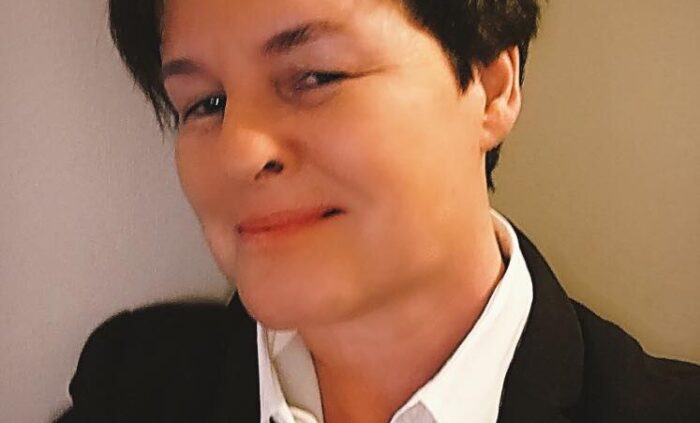Kate Johnston’s gentle comedy Stormcloud follows Vi’s emotional storm when two born-again Christians knock on her door in a vulnerable moment, is based on Johnston’s own experiences when she was in a similar predicament. Although the real story was no more than a polite exchange on the doorstep, in Stormcloud Johnston explores what if she’d said what she was really thinking? Awkward and hilarious, the central love story kindly yet persistently exposes the lines which cannot be crossed, in this case between the Christian characters and the love-wrecked Vi, but also for one of her visitors whose fascination with Vi reveals past temptations.
You can watch Stormcloud on QueerBee Films.
Creating a short film that provides representation of themes she wanted to see talked about more was the director’s objective. She says, “The questions that Vi asks about love are important. When a family or culture is informed by religion it can bring shame to sexuality and I wanted to explore that, and have the character say ‘what is wrong with love?’. This is still so relevant… people are being put to death or in prison or losing out when religious freedom trumps human rights. Stormcloud is political film… personal is political. I want to rebel against oppression through my art.”
Stormcloud went into production at a similar time to Johnston’s multi-award-winning feature, Tru Love and drew from many of the same crew involved in that project. The set was the house that Johnston lived in during the filming of Tru Love. Johnston says she is very proud of what the team achieved in an incredible, short turnaround film. “We shot over a weekend. It was an intense way to shoot but I haven’t laughed as hard as I did on that set. Ideally, I would have liked more takes but the pay-off was that I learned a lot and realised I was born to do this.”
Johnston is quick to share her learning with emerging filmmakers. She says, “Make sure you have a really good story. It starts with the script. Surround yourself with good people who support the vision. Work collaboratively. Treat everyone well off and on set. Get out there and do it. Everyone has a fear of failure but do it anyway. We all have Imposter Syndrome. When you ask if you can do it, say ‘yes’ and step off the cliff. Most importantly, create what you want to see or feel, what has never been made before. You have no control over whether people like it or not. And laugh through it all.”
Short films are of particular importance to the LGBTQI community, Johnston reflects, because “They have two clear purposes. Firstly, they give filmmakers the chance to hone their craft before making a feature film. Most filmmakers have no idea what they are doing until they have had a go at doing it. And secondly, some stories are just meant to be short, beautiful gems; not everything needs to be a feature. Even a minute can be enough to tell an honest story.”
And Johnston is certainly proving herself in terms of using the experience of honing her craft and putting her talent to good use. She recently finished directing a brand new play by Jan Miller Corran, in Los Angeles, starring Barbara Niven – the world premiere of a two-hour play, with only a couple of weeks rehearsing. Johnston says she is “proud to have captained a ship that drew on my learning from writing and making films, giving me a keen sense of what was needed to work exceptionally quickly and effectively and create and stage the dramatic cinematic visuals and emotional tension of each scene. I was humbled by response of actors to their experience on set, and by their performances. I was delighted that the play was a hit with critics and audiences loved it.”
Johnston continues to write film scripts including collaborations with Jan Miller and Joie Lamar and with QueerBee founders Jac and Angie. However, as always, financing for female-driven projects is more difficult in the current climate but changing very slowly for the better.
With the difficulty of finding finance for feature projects, short films can bridge the gap for LGBTQI content creators. Johnston says she is “grateful that there is LGBTQI cinema out there. We need to see our stories and lives out there, visible to ourselves. Film can affect change, and change lives. They transcend, liberate, educate and inform; connect to our own lives and other people so we don’t feel so isolated and alone. That is why I make films.”
You can watch Stormcloud now on the QueerBee platform. Login or subscribe to find this film and hundreds of other short films aimed at LGBTQI audiences.
